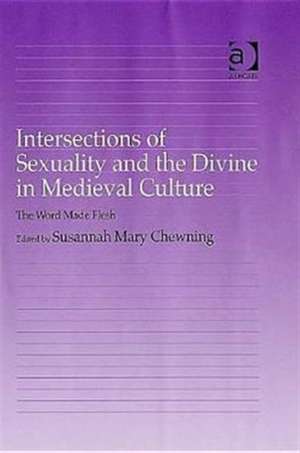Intersections of Sexuality and the Divine in Medieval Culture: The Word Made Flesh
Editat de Susannah Chewningen Limba Engleză Hardback – 15 feb 2005
| Toate formatele și edițiile | Preț | Express |
|---|---|---|
| Paperback (1) | 338.33 lei 6-8 săpt. | |
| Taylor & Francis – 11 noi 2016 | 338.33 lei 6-8 săpt. | |
| Hardback (1) | 766.66 lei 6-8 săpt. | |
| Taylor & Francis – 15 feb 2005 | 766.66 lei 6-8 săpt. |
Preț: 766.66 lei
Preț vechi: 1028.86 lei
-25% Nou
Puncte Express: 1150
Preț estimativ în valută:
146.70€ • 153.72$ • 121.27£
146.70€ • 153.72$ • 121.27£
Carte tipărită la comandă
Livrare economică 12-26 aprilie
Preluare comenzi: 021 569.72.76
Specificații
ISBN-13: 9780754640653
ISBN-10: 0754640655
Pagini: 228
Dimensiuni: 153 x 219 x 13 mm
Greutate: 0.45 kg
Ediția:1
Editura: Taylor & Francis
Colecția Routledge
Locul publicării:Oxford, United Kingdom
ISBN-10: 0754640655
Pagini: 228
Dimensiuni: 153 x 219 x 13 mm
Greutate: 0.45 kg
Ediția:1
Editura: Taylor & Francis
Colecția Routledge
Locul publicării:Oxford, United Kingdom
Cuprins
Contents: Foreword; Introduction, Susannah Mary Chewning. Part I Secular Literature and Drama: Religion, sexuality, and representation in the York Joseph's Troubles pageant, Michael W. George; The gentrification of Eve: sexuality, speech, and self-regulation in noble conduct literature, Mark Addison Amos; Queer copulation and the pursuit of divine conjunction in two Middle English alchemical poems, Cynthea Masson. Part II Romance and Narrative: Via erotica/via mystica: a tour de force in the Merchant's Tale, M.C. Bodden; 'My Lemman Swete': gender and passion in Pearl, Catherine S. Cox. Part III Saints and Religious Women: Spectators of martyrdom: corporeality and sexuality in the Liflade ant te Passiun of Seinte Margarete, Julie E. Fromer; 'The woman who shares the king's bed': the innocent eroticism of Gertrud the Great of Helfta, Alexandra Barratt; Virgin, mother, whore: the sexual spirituality of Margery Kempe, Liz Herbert McAvoy. Part IV Visionaries and Mystics: Corpus Mysticum: text as body/body as text, David A. Salomon; Cross-dressing souls: same-sex desire and the mystic tradition in A Talkyng of the Loue of God, Michelle M. Sauer; 'Mi bodi henge/wið þi bodi': the paradox of sensuality in þe Wohunge of Ure Lauerd, Susannah Mary Chewning. Bibliography; Index.
Recenzii
’...a valuable contribution to the study of medieval sexuality and divinity and of Middle English Literature in general.’ Sixteenth Century Journal
Descriere
As distinct from the many recent collections and studies of medieval literature and culture that have focused on gender and sexuality as their major themes, this collection considers and serves to re-think and re-situate religion and sexuality together. Including 'traditional' works such as Chaucer and the Pearl-poet, as well as less well known and studied texts - such as alchemical texts and the Wohunge group - the contributors here focus on the meeting point of these two often-examined concepts. They seek an understanding of where sex and religion distinguish themselves from one another, and where they do not. This volume locates the Divine and the Erotic within the continuum of experience and devotion that characterize the paradox of the medieval world. Not merely original in their approaches, these authors seek a new vision of how these two inter-connected themes, - sexuality and the Divine - meet, connect, distinguish themselves, and merge within medieval life, language, and literature.
